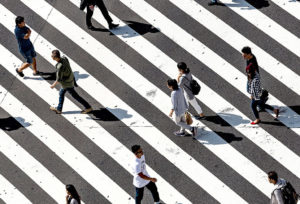
Different positions, opposing opinions, antagonisms, divergences… all normal and even desirable in society. Unanimism is usually linked to despotism, to the imposition of a way of thinking. But a balanced society, where different people have different thoughts, presupposes a respect for the other. Then comes another relevant question – to what extent is someone’s thinking and, consequently, their way of being affecting the well-being and health of others? When dealing with differences of opinion—on the one hand, the defence of the well-being and health of the individual and, on the other hand, the consequences that this defence of the self may have on the common good, i.e. public health—it becomes more complex to accept these differences as something normal and acceptable. Even more so if positions become extreme to the point of generating violence.
Given the number of Covid-19 cases and the of deaths it has left globally, the pandemic that has become a global emergency. It has also brought with it another type of illness that affects human relationships. The deep rift between sides is reaching worrying proportions. On one side we have the defenders of the security measures applied in the vast majority of countries and the urgent need to gain group immunity through the administration of vaccines. On the other, the denialists who refuse to recognize Covid-19 as a disease of concern and consequently do not accept the imposition of measures such as successive confinements, the use of face masks, and reject the vaccine. The gap is deep, and violence is increasingly latent. Society has split into these two major groups and the “war” is on.
Cary Wu, Assistant Professor in the Department of Sociology at York University, helps us understand what is happening and, while warning of the difficulty of predicting the future, reminds us that humans need to be connected to each other in order to be human.
Milénio Stadium: We all know the pandemic has changed the life of every one of us, but how do you evaluate the impact of Covid-19 on society? Globally, what are the most relevant changes in our social relationships?

Cary Wu: As a social science research, I collect data or use secondary data such as surveys, policy documents, qualitative interviews, and big data from online to explore social changes including changes in human values and behaviors before, during, the after the pandemic.
The pandemic is still ongoing. It is difficult to answer what are the most relevant changes in our social relationships. Different people also have their different perspectives. Some changes won’t be known until years/decades later. From my perspective, the most significant changes include
1. First the pandemic has exacerbated health inequalities across social categories. For example, high risk, high death rates among centre populations such as minorities and racialized population, and the elders (high mortality rate).
2. The pandemic has changed people’s lifestyle/healthy behaviors. For example, people will wash hands more often even after the pandemic. Mask wearing is likely to become a normal or more acceptable in places with lots of people in post pandemic.
MS: The public health protection measures have been attacked from the beginning by denialist movements. Can we consider that the pandemic has divided society in half (on a global scale)—on one side the denialists and on the other side those who follow the guidelines set by scientists and doctors?
CW: I agree that we can generally divide individuals in two groups in times of crisis. One group has more collective concerns for others, and willing to sacrifice individual rights/interests for the benefit of others. Another group more focus on individual rights and self interests. Globally, political ideology is the single best predictor of pandemic behaviours such as mask wearing, social distancing, follow stay-at-home orders.
MS: What impact will this division have in the medium/long term?
CW: The political/social divide will lead to lower social cohesion, lower trust among people, lower political support. All these have consequences for people’ health and wellbeing. For example, lower trust among people can exacerbate health inequalities, and can create negative impact on population health. Lack of trust hinders cooperation and collective actions, limiting efforts from individuals and communities.
MS: Is there a possibility that we will become much less sociable and much more distrustful and frightened when someone we do not recognise as belonging to our core (family or close friends) approaches us?
CW: This depends on social political contexts. In some societies and among certain populations, the pandemic has led to less trust, less social support and social connections. In others, the opposite is true. In Canada, our research suggests that social trust among different populations have shown three distinct trajectories of trust.
- Some people have become more trusting
- For some, trust has been stable, changed very little
- For others trust has declined.
We find that socioeconomic status and initial level of trust are main predictors of individuals’ placement in these trajectories of change. High SES people have become more trusting. Low SES people have become even less trusting. Hence the pandemic has exacerbated the trust inequality between the rich and the poor.
MS: How can we justify the degree of aggressiveness that has been associated with the anti-mask, anti-vaccine and anti-restrictive measures movements?
CW: People have different perspectives, political ideologies. However, it is less productive to focus on or blame “individuals” for how they behave. As a sociologist, we need to think what are the structural roots for social and individual behaviors. And think what we can do systematically/institutionally, or from a policy perspective, or through education, to change the society as a whole into a better one.
MS: Do you think this escalation of negative movements would have the same impact in a world without social networks? In other words, do social networks act as amplifiers of unsubstantiated messages?
CW: Of course, social networks/media/ are key factors that motivate/influence /or amplify how people react and what people do today. This is especially true among young generations who are deeply connected to their differential social networks.
MS: What can we expect from the future, when we have children who are living the “personality building” phase of their lives with little or no interaction with others?
CW: This is a big question. it is difficult to tell how the world will look like in post-pandemic. But I believe that humans need to be connected with each other to be humans. We will find ways to connect, to socialize with each other, and to build a SOCIETY.
MS: What does sociological history tell us about human behaviour as a gregarious being when other pandemics have occurred? What can we learn from the experiences of our ancestors?
CW: In times of crisis, it is import for people to be more optimistic and to be more communal. Our greater commitment to the pre-established social order will help us better control our behaviours and to have greater concerns for others as well. It is important for us to perceive good intentions from others since that will help facilitate collective action, which is essential for accomplishing critical tasks in emergency situations.
Catarina Balça/MS








Redes Sociais - Comentários